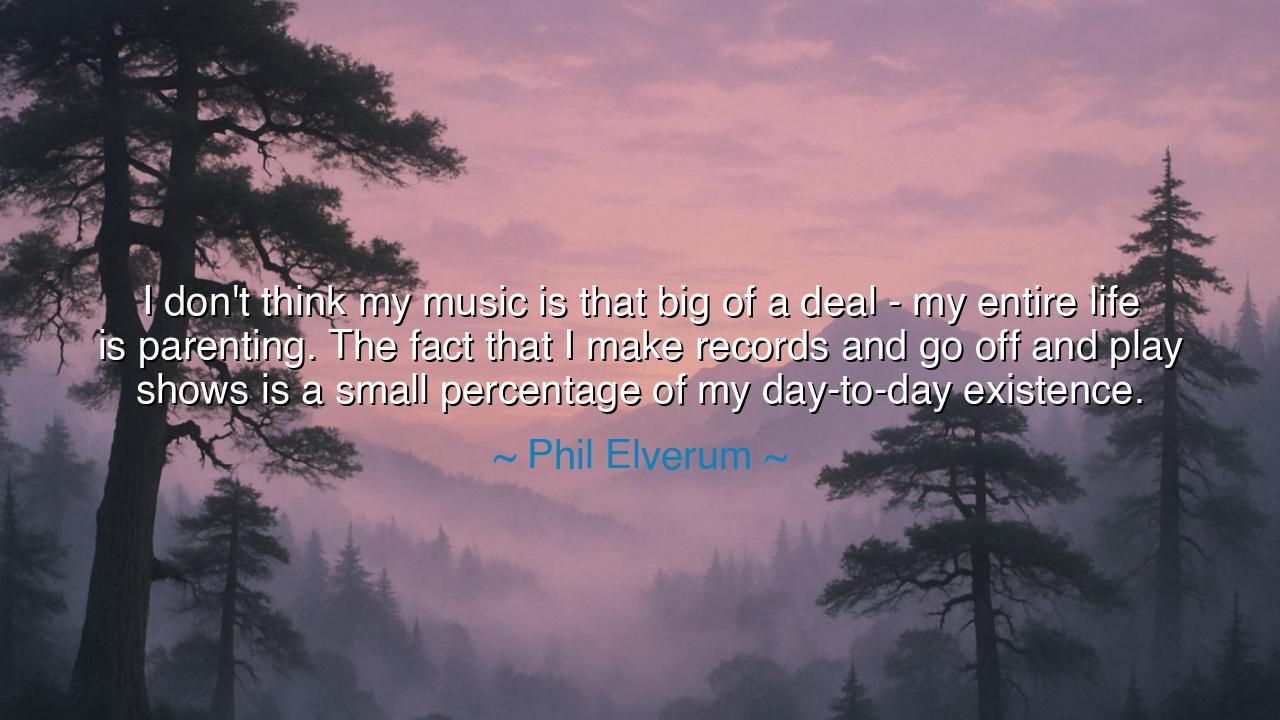
I don't think my music is that big of a deal - my entire life is
I don't think my music is that big of a deal - my entire life is parenting. The fact that I make records and go off and play shows is a small percentage of my day-to-day existence.






Phil Elverum, whose music has often been a meditation on grief, love, and the fleeting nature of life, once declared with quiet humility: “I don’t think my music is that big of a deal—my entire life is parenting. The fact that I make records and go off and play shows is a small percentage of my day-to-day existence.” These words strike like a soft bell in the soul. They remind us that while art and work may carry us into the public sphere, it is the intimate, unseen labor of raising children that defines the truest measure of a life.
The origin of this quote is deeply personal to Elverum. After the passing of his wife, Geneviève Castrée, he found himself not only a musician but also a single father. His grief and his music intertwined, but above all, the duty of parenting consumed his days and nights. In these circumstances, art—though once central—was humbled before the greater calling of nurturing a child. His words testify to the truth that music, no matter how powerful, cannot match the sacred responsibility of guiding another soul through life.
This truth has echoed through history. Marcus Aurelius, emperor of Rome, penned meditations that became eternal philosophy, yet even he confessed that the greatest test of character lay not in conquest or governance but in how one lived in daily devotion to others. Similarly, Elverum confesses that the shows, the records, the acclaim—all are but fragments, while parenting is the whole. The stage is fleeting, but the home is eternal; applause fades, but the love of a child endures.
His words also humble the notion of fame. In a world that prizes achievement, public recognition, and the grandeur of legacy, Elverum reminds us that true greatness lies in the quiet, unrecorded hours. A child will not remember the size of the audience or the reviews in the press, but the presence of a parent who listens, who comforts, who loves. By calling his music “not that big of a deal,” Elverum elevates the simple acts of daily care to the highest form of artistry.
There is in his confession also a paradox. By treating his art as secondary to his family, he enriches it. For art born out of a life lived in devotion carries greater depth than art born only of ambition. Just as Tolstoy’s greatest novels drew from his struggle to reconcile family and faith, Elverum’s music deepens because it flows from a heart that has known both loss and the redemptive power of parental love. The small percentage of shows, as he calls them, are magnified because they are nourished by the greater percentage—life itself.
The lesson for us is profound: do not be deceived into thinking that your worth lies only in what the world sees. The unseen labor of raising children, the sacrifices hidden from applause, may be the most important work of all. Value the quiet moments, the daily struggles, the unseen victories of the home. For in them lies a greatness that no stage, no record, no title can match.
Therefore, let Phil Elverum’s words be carried forward: “My entire life is parenting.” Let them remind us that the truest music we create may not be played on instruments, but in the lives of our children. Work may sustain us, art may inspire us, but love—constant, ordinary, unseen love—is what defines us. And if we devote ourselves to that calling, then all else, whether music or craft, will find its rightful place, no longer the center, but the echo of a life well-lived.






AAdministratorAdministrator
Welcome, honored guests. Please leave a comment, we will respond soon